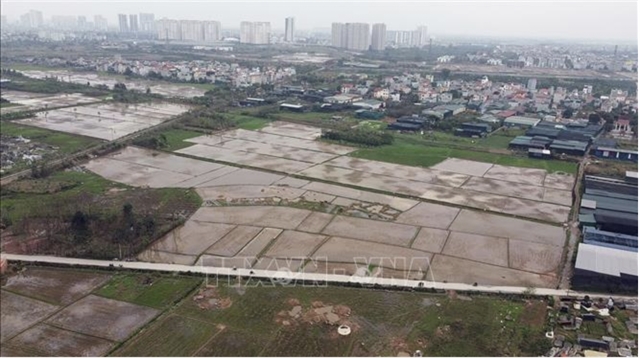 Society
Society


|
| There are many shortcomings in land recovery and compensation. VNA/VNS Photo |
HÀ NỘI – In recent years, the State Audit has conducted several audits and identified numerous limitations and shortcomings in land management, recovery, compensation, and resettlement.
The State Audit - Region 1 has reported that, through their practices, the processes of land recovery, compensation, and site clearance still face various limitations and issues. These include instances of land recovery not adhering to the necessary conditions and procedures as per regulations, as well as overlaps in determining the land ownership of organisations and households.
Furthermore, the compensation prices for land coverage remain significantly below the market rates, and the procedures for land recovery and compensation for damages during land recovery lack transparency. In certain projects, there have been cases of misidentifying beneficiaries and miscalculating compensation and financial support.
The resettlement arrangements, support for livelihood stabilisation, and job conversion have not met the requirements, leading to delays in compensation and site clearance, which, in turn, has a significant impact on the timely implementation of land-use plans, according to the agency's report.
Meanwhile, the State Audit - Region 4 has highlighted that incorrect determinations of land plot locations result in inaccurate compensation calculations, affecting land use fees and land rent deductions. Additionally, the timing of compensation for site clearance as a basis for calculating land prices, based on actual handover time, is not accurate, leading to reductions in land use fees to the State Budget.
The State Audit has carried out numerous specialised and integrated audits related to land management, use, and evaluation in various regions and for multiple projects that involve land use. These include urban land management, land of equitised enterprises, and urban construction planning.
According to the agency, the process of determining the price for compensation and resettlement support exhibits four main shortcomings.
Firstly, the determination of compensation unit prices is primarily based on valuation certificates from consulting units. However, these valuation certificates lack sufficient legal basis and reliability as per Vietnam Valuation Standard No. 8, issued in Circular No. 126/2015/TT-BTC on August 20, 2015.
Seconly, there are still violations in determining property compensation unit prices. For example, some localities determine the price of liquidated rubber trees using the cost approach, which is not in line with Clause 1, Article 90 of the 2013 Land Law. This regulation specifies that for perennial trees, compensation should be calculated based on the existing value of the garden at the time of land recovery without including the value of land use rights. Therefore, compensation and support prices must be determined following the market approach as stipulated in Circular No. 126/2015/TT-BTC dated August 20, 2015, by the Ministry of Finance.
Thirdly, the handling of the liquidation value of assets on recovered land after compensation from the State remains problematic. It is unclear whether these assets belong to the enterprise or the State, and whether the liquidation value should be deducted from the State's compensation amount.
Fourthly, regulations regarding compensation and land recovery for individuals and households still have some shortcomings. The life stabilisation support policy, as outlined in Clause 1, Article 19 of Decree No. 47/2014/ND-CP, specifies the eligible subjects as households and individuals allocated agricultural land by the State but does not specify individuals directly involved in agricultural production on the recovered land plots. This has led to situations in some localities where individuals make land transfers through authorisation contracts to speculate and profit from land sales while still receiving financial stabilisation support.
Regarding the policy of supporting land recovery for those not eligible for compensation, the agency noted that some localities have issued regulations allowing resettlement arrangements for households and individuals with houses built on agricultural land, contrary to the regulations in the 2013 Land Law. VNS





 Brandinfo
Brandinfo